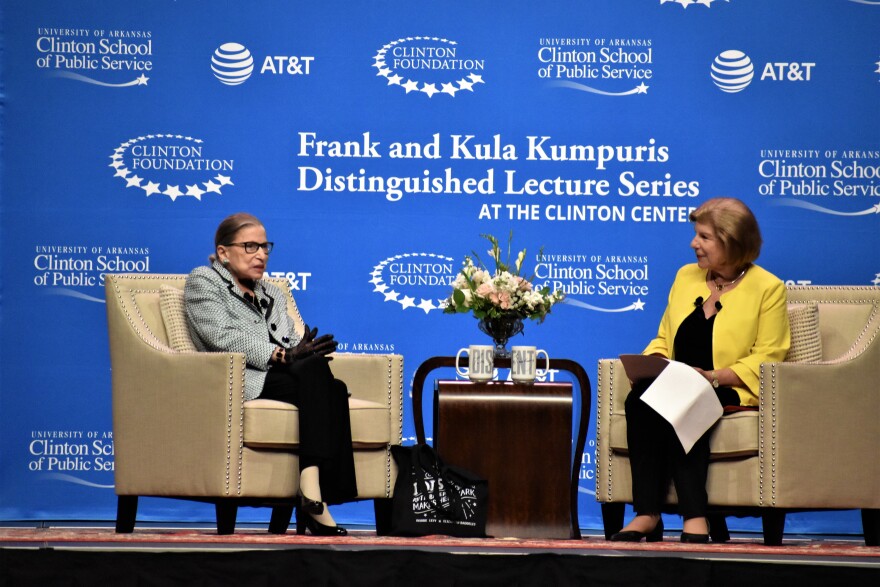U.S. Supreme Court Justice Ruth Bader Ginsburg used her appearance in Arkansas Tuesday to recount her life in law, and the reasoning behind her decisions and dissents of the past 26 years.
Ginsburg spoke to a sold out crowd at North Little Rock's Verizon Arena as part of the Clinton School of Public Service's Kumpuris Distinguished Lecture Series. The school's namesake, former President Bill Clinton introduced the justice he appointed to the nation's highest court in 1993.
"I thought she had the ability to build common ground in a country that was already becoming increasingly polarized," Clinton said, "to find a way, whenever possible, for the Court to be an instrument of our common unity, and their fidelity for the Constitution."
Ginsburg, who spoke with NPR Legal Affairs Correspondent Nina Totenberg during the lecture, said she'd promised Clinton she would come to Arkansas to speak, less than two weeks after receiving radiation therapy for cancer.
Ginsburg reassured the crowd of around 15,000 (the largest she'd spoken to, according to Totenberg) that she was in good spirits.
"I think my work is what saved me because instead of dwelling on my physical discomforts, if I have an opinion to write or I have a brief to read, I know I've just got to get it done. And so I get over it," Ginsburg said.
The 86-year-old Ginsburg recounted some of her more memorable cases on gender equality, marriage equality and civil rights, both on and off the high court. But one decision she wasn’t a part of, Weinberger v. Wiesenfeld of 1975, Ginsburg highlighted as the first Supreme Court decision striking down gender-based discrimination.
When talking about the discrimination she faced as a woman and a mother, Ginsburg recalled a conversation with her only female predecessor on the Supreme Court, retired Justice Sandra Day O'Connor.
"She said, 'Suppose we had graduated from law school at a time when there was no discrimination, when women were welcome at the bar. What would we be today? We would be retired partners from some large law firm.' But that route wasn't open to us, so we had to find another. And that path led us to become Supreme Court justices," Ginsburg said.
Ginsburg underscored the importance of civility and finding common ground, looking back on her friendship with late Supreme Court Justice Antonin Scalia, a noted conservative and Constitutional "originalist."
Ginsburg elaborated on her views of the Constitution by alluding to the Court's first African-American justice, Thurgood Marshall.
"[Marshall] said he doesn't celebrate the original Constitution, but he does celebrate what the Constitution has become… well over two centuries. And that is: the concept of 'We the People' has become ever more inclusive. The people who were left out at the beginning, slaves, women, men without property, Native Americans… now all those once left-out people are part of our political constituency.
"And we are certainly a more perfect union as a result of that."



